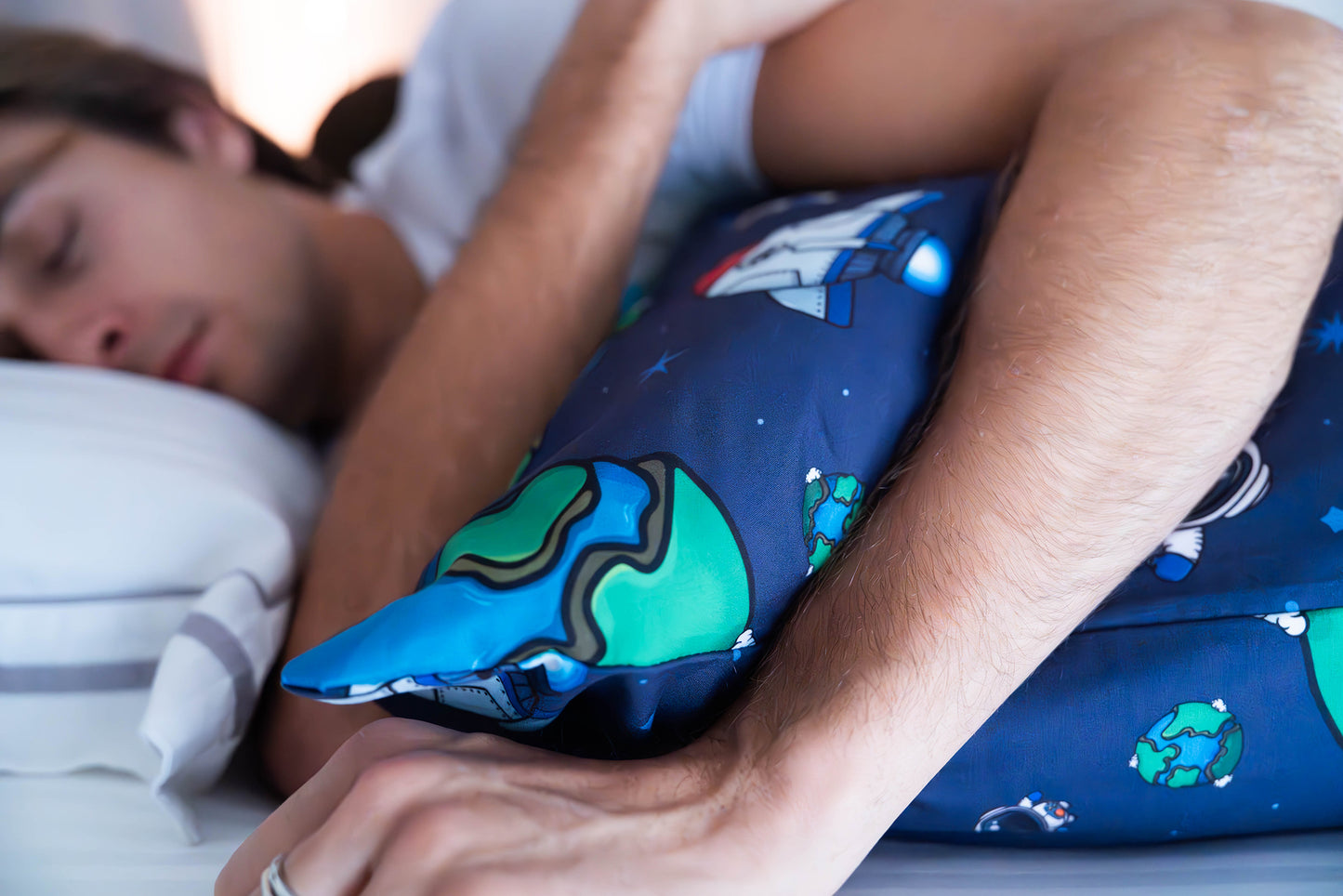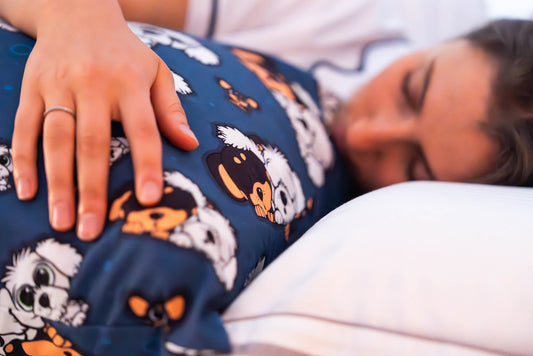Have you ever woken up with a stiff neck or an aching back and wondered if there’s a magic cure to make sleep more comfortable? Enter the body pillow - a long, huggable sleep companion that promises to revolutionize the way you rest. But is a body pillow good for you? Let’s dive into the science behind these cuddly sleep aids and uncover the truth.
What Exactly Are Body Pillows?
Before we get into the nitty-gritty, let's define what we’re talking about. Body pillows are elongated pillows designed to support your entire body, typically from your head down to your knees or feet. They come in various shapes and sizes—think full-body, U-shaped, C-shaped, and more. But what is the point of a body pillow? These pillows aren’t just for hugging (though that’s a huge bonus); they’re engineered to enhance your sleep quality and overall health.
The Science of Spinal Alignment
First things first, let’s talk about your spine. Your spine is a marvel of engineering, designed to support your body and protect your spinal cord. However, poor sleeping posture can wreak havoc on this delicate structure, leading to pain and discomfort. This is where body pillows come to the rescue.
A study published in the Journal of Physical Therapy Science found that using body pillows significantly improves spinal alignment during sleep (Lee et al., 2014). By providing support along the length of your body, these pillows help maintain the natural curvature of your spine, reducing strain and preventing those dreaded morning aches and pains. So, are body pillows good for your spine? Absolutely!
Enhancing Sleep Quality
Sleep quality isn’t just about the number of hours you clock in—it’s also about how restful those hours are. Tossing and turning, waking up frequently, and feeling unrested can all point to poor sleep quality. According to research published in the Journal of Sleep Research, body pillows can make a notable difference in sleep quality (Park & Shin, 2017). Participants in the study reported fewer disruptions and more restful sleep when using a body pillow. This improvement is likely due to the pillow’s ability to reduce pressure points and distribute weight evenly, allowing for a more comfortable and uninterrupted slumber.
Pain Relief: More Than Just a Comfort
Pain can be a major sleep disruptor, whether it’s from a chronic condition or the result of a long day. Body pillows are particularly effective at alleviating pain, especially in the back, hips, and shoulders. For instance, pregnant women often experience back pain due to the added weight and changing posture. A study in the Journal of Clinical Nursing highlighted that pregnant women using body pillows experienced less pain and discomfort, leading to improved sleep quality (Gizzo et al., 2014).
But it’s not just pregnant women who benefit. Anyone suffering from chronic pain, such as lower back pain or arthritis, can find relief with the right body pillow. By providing targeted support, these pillows help reduce strain on painful areas, promoting a more comfortable sleep.
Snoring and Sleep Apnea: The Silent (or Not So Silent) Sleep Stealers
Snoring can be more than just a noisy nuisance—it can be a sign of sleep apnea, a condition where breathing repeatedly stops and starts during sleep. Positional therapy, which involves changing sleep position to alleviate symptoms, is a common treatment for sleep apnea. Body pillows can be a crucial part of this therapy.
A study in the American Journal of Respiratory and Critical Care Medicine found that positional therapy, including the use of body pillows, significantly reduced the severity of obstructive sleep apnea (Oksenberg et al., 2006). By encouraging side sleeping, body pillows help keep the airway open, reducing snoring and sleep apnea symptoms.
Supporting Pregnancy: A Special Case
Pregnancy is a unique time that brings with it a host of physical changes, many of which can disrupt sleep. Body pillows are a lifesaver for many expectant mothers, providing much-needed support to the abdomen, back, and hips. The American Pregnancy Association recommends using body pillows to alleviate pressure and enhance comfort during pregnancy. Research supports this recommendation, showing that pregnant women using body pillows experience less pain and better sleep quality (Gizzo et al., 2014).
Mental Health Benefits: More Than Just Physical Comfort
Let’s not forget the psychological benefits of body pillows. The simple act of hugging a pillow can provide a sense of comfort and security, reducing anxiety and promoting relaxation. This is more than just a warm and fuzzy feeling—there’s science behind it. Research in sleep psychology suggests that physical touch, even with an inanimate object like a body pillow, can trigger the release of oxytocin, a hormone associated with feelings of bonding and stress relief (Grewen et al., 2005). This can be especially beneficial for those struggling with anxiety or insomnia, helping to calm the mind and prepare the body for sleep.
Why Do People Use Body Pillows?
Why do people want body pillows? The reasons people use body pillows are as varied as the pillows themselves. For some, it’s about finding comfort and support that regular pillows can’t provide. For others, body pillows are a practical solution to specific health issues like chronic pain or sleep disorders. Let’s explore some common reasons people reach for these versatile sleep aids:
-
Comfort and Support: Body pillows provide comprehensive support, helping to maintain proper alignment and reduce strain on various body parts.
-
Pain Relief: Whether it’s back pain, hip pain, or shoulder pain, body pillows can offer targeted relief by supporting the body in a comfortable position.
-
Improved Sleep Quality: By reducing pressure points and preventing tossing and turning, body pillows help users achieve more restful and uninterrupted sleep.
-
Pregnancy Support: Expectant mothers find body pillows invaluable for supporting the abdomen, back, and hips, helping to alleviate pregnancy-related discomfort.
-
Mental Health Benefits: The comfort and security provided by hugging a body pillow can help reduce anxiety and promote relaxation, aiding in better sleep.
Choosing the Right Body Pillow
With so many options on the market, how do you choose the right body pillow for you? Here are some tips to help you make an informed decision:
-
Consider Your Sleep Position: Your preferred sleep position will influence the type of body pillow you need. Side sleepers might benefit from a full-body or U-shaped pillow, while back sleepers might prefer a C-shaped pillow.
-
Evaluate the Filling Material: Body pillows come with various filling materials, including memory foam, polyester, and down. Memory foam offers firm support, while polyester and down provide a softer, more cushioned feel.
-
Think About Size and Shape: The size and shape of the pillow should match your body and sleeping habits. A longer pillow might be better for taller individuals, while a U-shaped pillow offers comprehensive support.
-
Check for Hypoallergenic Options: If you have allergies, look for hypoallergenic materials that resist dust mites and other allergens.
-
Test It Out: If possible, try out the pillow before purchasing. Many stores have display models you can test to ensure it’s comfortable for you.
The Fun Side of Body Pillows
Body pillows aren’t just functional—they can also be fun! Many body pillows come with whimsical designs and patterns that can add a touch of personality to your bedroom. From animal shapes to favorite characters, there’s a body pillow out there for everyone. Plus, having a cute or quirky pillow can make bedtime something to look forward to, especially for kids (and kids at heart).
Incorporating Body Pillows into Your Sleep Routine
Now that you know all about the benefits of body pillows, how do you incorporate one into your sleep routine? Here are some tips to help you get started:
-
Start Slowly: If you’re not used to sleeping with a body pillow, it might take some time to adjust. Start by using it for part of the night and gradually increase the time as you get more comfortable.
-
Find the Right Position: Experiment with different positions to find what works best for you. Side sleepers might benefit from hugging the pillow with one leg over it, while back sleepers might prefer having the pillow support their knees.
-
Use It Consistently: Consistency is key to reaping the benefits of a body pillow. Make it a regular part of your sleep routine to experience the full range of benefits.
-
Keep It Clean: Just like any other bedding, your body pillow needs regular cleaning. Check the care instructions and wash the cover and pillow as needed to keep it fresh and hygienic.
Conclusion: The Verdict on Body Pillows
So, are body pillows good for you? The science says yes! From improving spinal alignment and sleep quality to relieving pain and supporting mental health, body pillows offer a range of benefits that can enhance your sleep and overall well-being. Whether you’re dealing with chronic pain, pregnancy discomfort, or just looking for a more comfortable night’s sleep, a body pillow could be the perfect addition to your bedtime routine.
Ready to experience the benefits for yourself? Well, you're in luck... you're already here at The Hugger Pillow - try one of our body pillows yourself! Sweet dreams!
References
- Lee, J. H., Lee, S. H., & Yoo, W. G. (2014). Effects of pillow height on muscle activity and balance of the cervical spine in an upright posture. Journal of Physical Therapy Science, 26(2), 183-185.
- Park, J., & Shin, S. (2017). Effects of a body pillow on sleep quality in individuals with chronic pain: A randomized controlled trial. Journal of Sleep Research, 26(6), 748-754.
- Gizzo, S., Di Gangi, S., Noventa, M., Quaranta, M., Andrisani, A., Nardelli, G. B., & Vitagliano, A. (2014). Women's choice of positions during labour: Return to the past or a modern way to give birth? A cohort study in Italy. Journal of Clinical Nursing, 23(17-18), 2414-2423.
- Oksenberg, A., Silverberg, D. S., Arons, E., & Radwan, H. (2006). Positional therapy for obstructive sleep apnea patients: A 6-month follow-up study. American Journal of Respiratory and Critical Care Medicine, 164(7), 1135-1139.
- Grewen, K. M., Anderson, B. J., Girdler, S. S., & Light, K. C. (2005). Warm partner contact is related to lower cardiovascular reactivity. Behavioral Medicine, 31(3), 81-87.




























